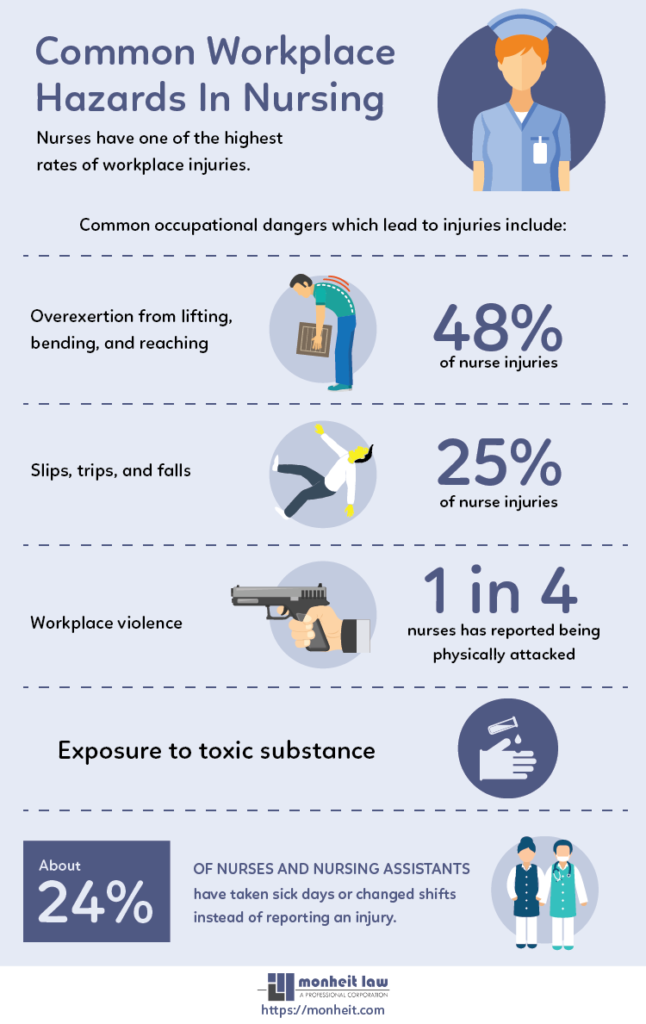Were you or a loved one injured while working as a nurse? You may have questions about your recovery:
- Should I file a claim for Workers' Comp?
- What do I need to provide for a successful claim?
- Could I qualify for other forms of compensation?
- How could a lawyer help?
We can help you with any concerns you may have during your injury recovery.

Our experienced work injury lawyers can help you earn the compensation you deserve.
Nursing in an extremely demanding profession. In fact, according to the Occupational Safety and Health Administration (OSHA), nursing has the highest rate of nonfatal occupational injuries - even higher than construction and factory workers. Nurses and other healthcare workers are regularly exposed to a wide range of  occupational hazards. They selflessly face these dangers each day in order to keep their patients safe.
occupational hazards. They selflessly face these dangers each day in order to keep their patients safe.
When a nurse gets injured, he or she may hesitate to apply for the compensation they deserve. Many nurses feel they have an obligation to push through injuries in order to attend to patients. In 2011, approximately 24% of nurses and nursing assistants changed shifts or took sick days instead of reporting their injuries.
We understand why an injured nurse might hesitate to miss work. You may not want to feel like you're abandoning patients who have come to rely on you. But forcing yourself to work through the pain can result in serious complications in the future which could possibly prevent you from working permanently.
It's much better to allow yourself the proper time to recover so that when you return, you can work at your highest level. In Pennsylvania, nurses, along with virtually all other workers, are eligible to file a claim for Workers' Compensation when an injury interferes with their ability to work.
However, this process can be complex and confusing. Though you have the right to file for benefits, that doesn't mean you'll always get them.
FREE CONSULTATION
What Do I Need For A Successful Claim?
In order to receive benefits, you must first satisfy all of the requirements of the Workers' Comp board. All workers should make sure to follow these steps after an injury on the job.
Seek Medical Care
Begin the recovery process as soon as possible by getting treatment for your injuries. Prompt medical care is the best way to prevent your condition from worsening and to begin documenting the injury for the claims process.
Report The Injury
File an official injury report with your employer - the sooner the better. The state suggests that you do this within 21 days, but you absolutely must within 120 days, otherwise you may lose your right to file a claim. But ideally, you would tell your supervisor before you leave work that day.
Make sure to provide as many details as possible, including where the injury happened, how it happened, and the symptoms you're experiencing. After you've reported your injury, your employer is required to notify the insurance company of your claim. Check in with them after a week or so to make sure they've filed the claim.
The longer you wait to report an injury, the more suspicious your employer and their insurance carrier may become. A quick filing greatly increases the chance that your claim will be accepted.
Request Medical Records
Within 48 hours of your first injury treatment, ask your doctor for an initial report on your injuries. This is a vital piece of evidence in any Workers' Comp claim.
Consider Speaking With An Attorney
Though you aren't legally required to have an attorney for these claims, an experienced work injury attorney can help to simplify the process. At Monheit Law, our attorneys have worked on countless work injury cases. We know what is expected for a successful claim.
Additionally, a knowledgeable attorney may assist you in seeking other forms of compensation, if applicable. Legal guidance is often the best way to receive full compensation for work injuries.
When Is Other Compensation Possible?
If a third party not employed by your workplace played a role in your injury, you may have a viable case for a personal injury claim. For example, if you're a homecare nurse and hurt yourself slipping on ice outside of a patient's home, you could potentially hold the property owner liable for damages outside of Workers' Comp.
You must prove that the property owner's negligence directly caused your injury. So in this example, the property owner must have known, or should have reasonably known about the dangerous ice conditions but did nothing to address the situation.
Common Nursing Injuries & Causes
The Bureau of Labor Statistics keeps detailed records on injuries which result in missed days at work. They've identified the five top causes of injuries among healthcare workers as:
- Overexertion and bodily reaction - This category accounts for 48% of injuries resulting in days away from work. Common causes include lifting, bending, and reaching, especially while handling patients. Overexertion correlates with the sprains and strains, which is the top injury at 54%. 80% of nurses say they frequently work through musculoskeletal pain.
- Slips, trips, and falls - Slips, trips, and falls account for about 25% of all nursing injuries. Nurses are required to move quickly through hectic environments. It can be easy to miss an unsafe floor condition which could result in an injury.
- Contact with objects - Contact with objects or equipment cause 13% of away from work nursing injuries.
- Violence - Nurses may be forced to work with dangerous or violent patients. A shocking 1 in 4 nurses has reported being physically attacked at work in the past year.
- Exposure to substances - Hospitals are filled with various hazardous substances which could cause injuries, illnesses, or even death. Examples include toxic materials, radiation, and exposure to infectious diseases through contaminated blood or needles.

Is A Lawyer Necessary?
If you've suffered an injury while on the job as a nurse, don't be afraid to take the steps necessary to protect yourself. While you're allowed to seek compensation on your own, you may face difficulties if your employer or their insurance representatives look for ways to limit or deny your coverage.
At Monheit Law, our experienced work injury attorneys have the knowledge necessary to help you with the following matters:
- Gathering appropriate evidence and filing an initial claim
- Filing a successful appeal for a denied claim
- Dealing with the insurance company to prevent complications
- Offering legal guidance before giving an insurance statement
- Investigating additional forms of compensation
If you're uncertain if you need a lawyer, we offer no-risk free consultations. This way, we can get a better feel for each other before you make a commitment. And if you're worried about fees, don't be. We only require payment after we win a case, which will be deducted from your Workers' Comp benefits.
What Else You Should Know After A Work Injury
Monheit Law Montgomery County Office 215-866-2018
Directions to our Montgomery County Injury Law Office
4V4Q+FM Jenkintown, Pennsylvania
Open 24 hours
Nurse workplace injury attorney Jenkintown
Civil law attorney
Employment attorney
Law firm
Attorney
Social security attorney
Monheit Law South Philly Office 215-302-0095
Directions to our South Philly Injury Law Office
WRCH+CP Philadelphia, Pennsylvania
Open 24 hours
Nurse workplace injury attorney South Philly
Civil law attorney
Employment attorney
Law firm
Attorney
Social security attorney
